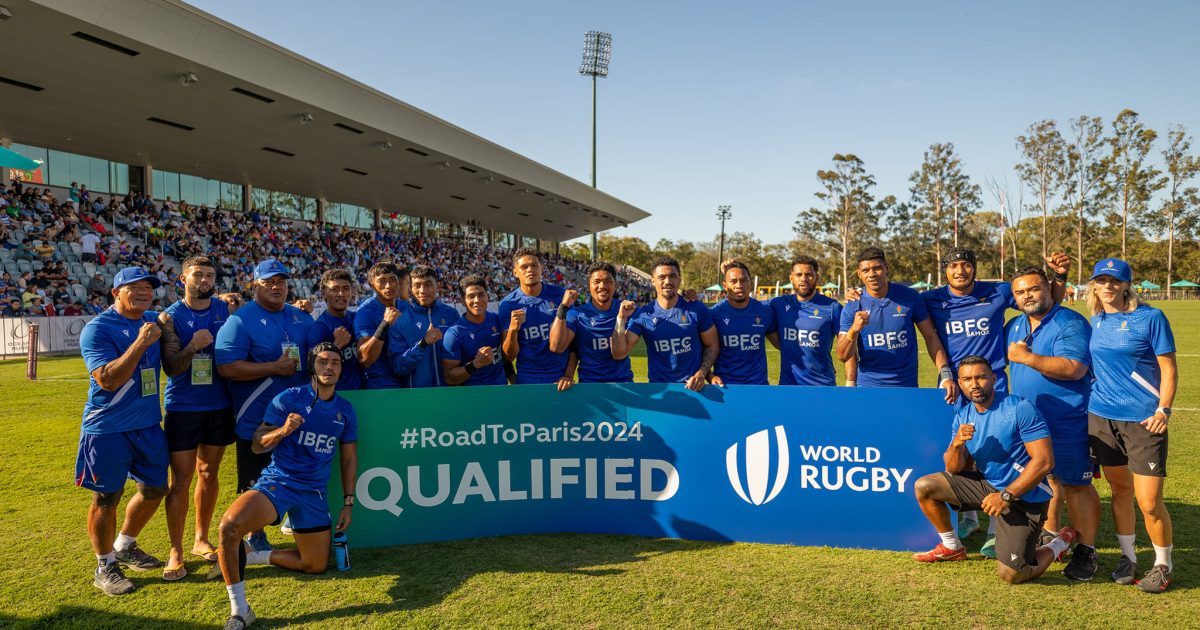Les Samoans et les Fidjiennes ont décroché leur billet pour les Jeux olympiques de Paris 2024 lors de l’Oceania Rugby Sevens Championship 2023 à Brisbane.
Les Samoa de Brian Lima feront ainsi leurs débuts olympiques en France l’année prochaine après avoir bouclé un week-end impressionnant en battant la Papouasie-Nouvelle-Guinée 24-0 lors de la finale du tournoi masculin dimanche 12 novembre.
Un peu plus tôt au Ballymore Stadium, les Fijiana s’étaient assurées de leur place à Paris en remportant 54-0 la finale du tournoi féminin, également contre la Papouasie-Nouvelle-Guinée.
Ni les Samoans ni les Fidjiennes n’ont pu doubler leur qualification avec le titre de champions du Oceania Sevens, puisque les All Blacks Sevens et l’Australie ont remporté les finales respectives du championnat organisé à Brisbane du 10 au 12 novembre.
La quête d’une qualification olympique se poursuit pour les joueurs et les joueuses de Papouasie-Nouvelle-Guinée, ainsi que pour les joueurs des Tonga et les joueuses des Samoa, qui participeront au Tournoi de Qualification Olympique Final en 2024 après avoir terminé le Oceania Rugby Sevens Championship en tant que deuxième et troisième nations non qualifiées les mieux classées dans chacun des tournois.
Les Samoans n’ont pas laissé passer leur chance
Les Samoa avaient manqué la qualification olympique automatique via les World Rugby Sevens Series 2023 d’un seul point et n’étaient pas d’humeur à laisser passer une autre opportunité à Brisbane.
Après avoir ouvert leur campagne dans la poule B du tournoi masculin en battant Tuvalu 36-0 vendredi, les Samoa se sont hissés en finale avec un bilan parfait de quatre victoires en quatre rencontres, sans avoir concédé le moindre point.
Les Îles Salomon ont été battues 50-0 avant de marquer 52 points contre les Samoa américaines et de s’imposer 46-0 contre les Îles Cook.
Ces résultats ont ouvert la voie à une finale masculine contre la Papouasie-Nouvelle-Guinée, dont le résultat le plus marquant du week-end a été une victoire à l’arraché 24-21 sur les Tonga lors de la première journée.
Les Samoa ont toutefois fait en sorte que la finale soit beaucoup plus simple à gérer, en s’imposant 24-0 au Ballymore Stadium pour mettre fin à leur attente d’une qualification olympique.
Les hommes de Brian Lima ont ensuite disputé la finale du championnat de Brisbane contre la Nouvelle-Zélande, mais c’était sans compter sur les All Blacks Sevens qui ont remporté le titre en s’imposant 24-19 après prolongation.
Les Fidjiennes se rattrapent

Les Fidjiennes, médaillées de bronze à Tokyo, avaient été devancées par l’Irlande dans la course à la qualification automatique lors des Series 2023, mais elles n’ont pas laissé cette déception les affecter à Brisbane.
Les Fidji n’ont concédé que cinq points lors de leurs trois matchs de poule, battant les Îles Cook 50-0, les Tonga 38-5 puis les Samoa américaines débutantes 68-0 en route vers les demi-finales du tournoi féminin.
Les Samoa ont ensuite été battues 42-0 en demi-finale, préparant un match décisif contre la Papouasie-Nouvelle-Guinée au Ballymore Stadium.
Les Fidjiennes ont assuré leur retour aux Jeux de Paris l’année prochaine grâce à une impressionnante victoire 54-0 dans le match décisif.
La victoire a également permis aux Fijiana de se qualifier pour la finale du championnat contre l’Australie, mais elles ont été battues 26-0 par les championnes olympiques de 2016.
Liste des équipes qualifiées pour le tournoi olympique masculin
Nouvelle-Zélande, Fidji, Australie, France, Argentine, Irlande, Kenya, États-Unis, Uruguay et Samoa.
Liste des équipes qualifiées pour le tournoi olympique féminin
Nouvelle-Zélande, Australie, France, Brésil, Canada, Grande-Bretagne, Irlande, Afrique du Sud, États-Unis et Fidji.
Photos : Oceania Rugby Union







































